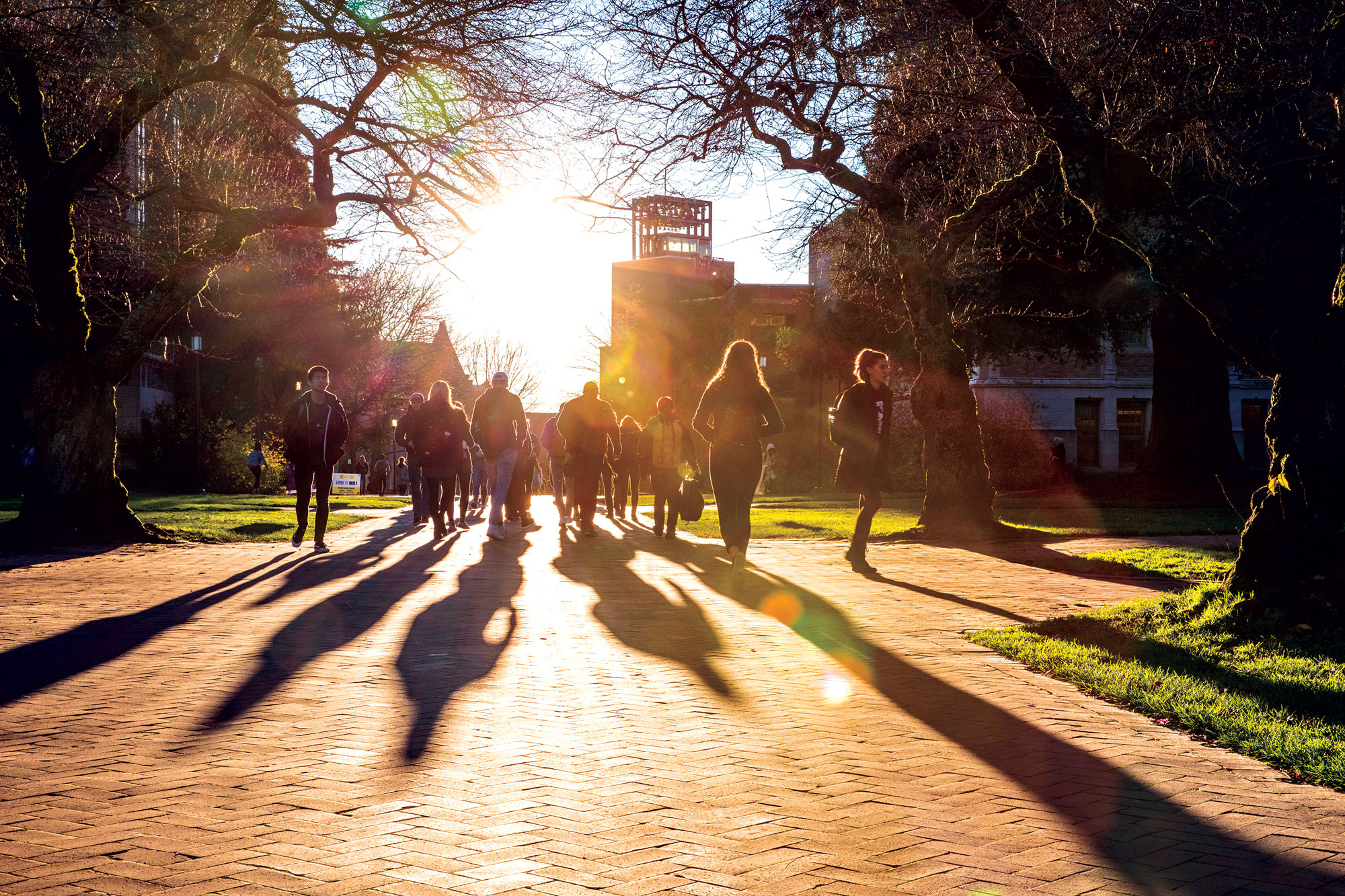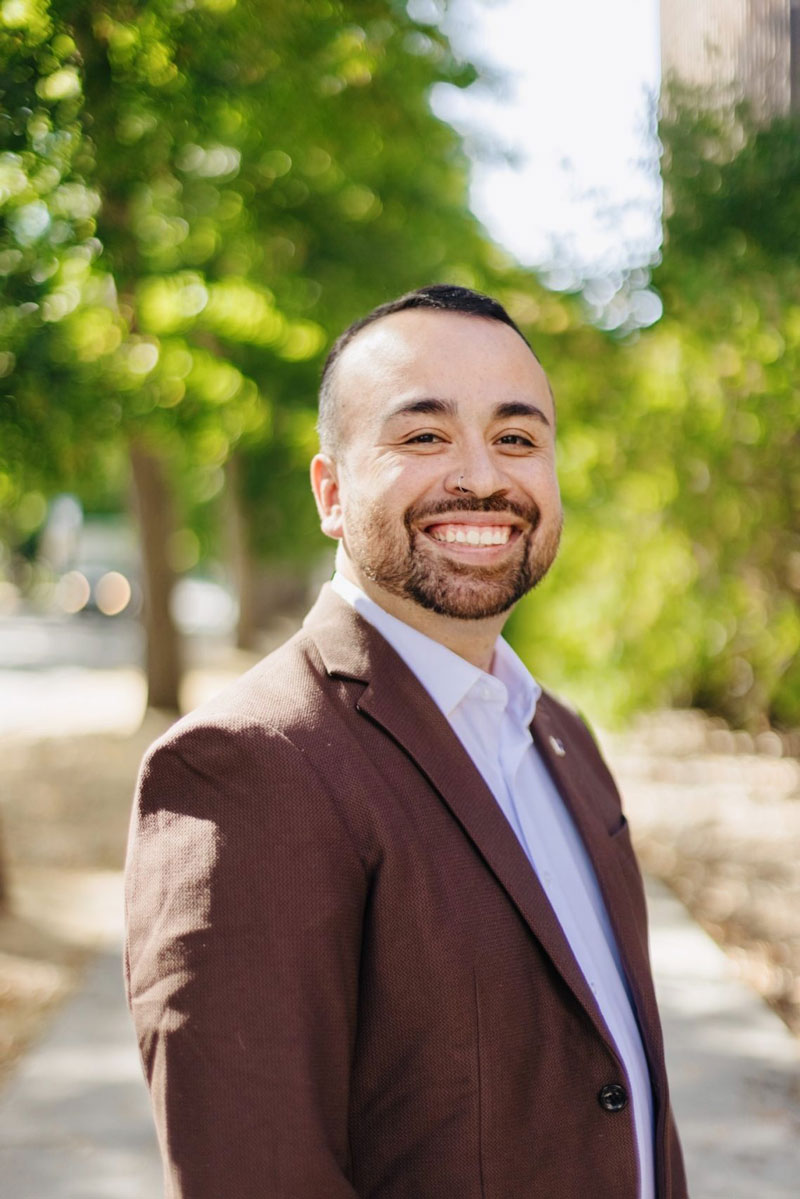
Nurturing new leaders Nurturing new leaders Nurturing new leaders
Leadership Without Borders, now 10 years old, empowers and serves undocumented students on campus.
By Caitlin Klask | Photo by Mark Stone | Viewpoint Magazine
When you're an undocumented student, nearly every step of your college journey is a challenge. Juggling essays, transcripts, financial aid, school tours and choosing a major, you’re also navigating immigration policies and risking exposing your citizenship status. It’s a time when students need a resource, and 10 years ago, the UW’s Leadership Without Borders program formed to fill that need.
Located in the Samuel E. Kelly Ethnic and Cultural Center, Leadership Without Borders educates students on systemic barriers while providing basic resources like textbooks through the Husky Lending Library. But they also provide a simple necessity: A safe space. “When you walked into an office on campus, you never knew if you were able to feel welcome,” says Yuriana Garcia Tellez, ’18, who served for nearly three years as the Leadership Without Borders coordinator at the UW and now works in talent acquisition for Netflix. “Professors had no idea about our student experience. We were closeted. But I would talk to anybody who would listen about how we were under-resourced.”
“The toughest thing at the UW is finding a community,” says Dr. Carlos Estrada Alamo, ’11, who came to the UW as an undocumented student before Leadership Without Borders existed. He found academic support from his departmental advisors and the Office of Minority Affairs & Diversity Instructional Center—part of the UW’s Educational Opportunity Program, but otherwise, resources for undocumented students were scarce.
Estrada Alamo, now an anesthesiologist at Virginia Mason hospital, remembers looking for financial aid advice and coming up empty. “Even if there was an answer about a question you had, it was often not applicable to you,” he says. “Or there’s this big asterisk about these ten extra things you had to do in order to even be considered.” He eventually found help from fellow undocumented applicants on internet forums. Fortunately, he was chosen for a Costco Diversity Scholarship. “The scholarship signified to me that I was welcome, that they wanted me there. So I attended the UW,” he says.

Hugo Garcia Villa, who runs the UW’s Leadership Without Borders program, often speaks at conferences and colleges to share his wealth of knowledge on empowering undocumented students.
Having a resource like Leadership Without Borders “is important—to find community, to be seen, to be heard, to be understood. It goes a long way,” says Hugo Garcia Villa, the program manager. “When you build community, you build networks and relationships. A lot of the time, you don’t find that in a big institution like the UW.”
Immigration status has been used as a tool for political power, resulting in systemic policy barriers, like preventing undocumented students from receiving federal aid. The Trump Administration, for example, sought to repeal the Deferred Action for Childhood Arrivals policy (DACA) despite the overall positive impact of the program on immigrants and native-born Americans, Garcia Villa says.
“There have been a lot of political efforts to dismantle and terminate DACA,” says Garcia Villa. “What kind of repercussions would that have? Think about how many DACA recipients are working in the health-care industry.” According to the American Medical Association, it’s about 30,000.
In 2003, Washington’s legislature approved HB 1079, which allows elegible undocumented students to be considered as state residents for purposes of higher education. In the wake of the legislation, UW staff and students created Leadership Without Borders to help with a range of needs and experiences including financial literacy, considering graduate school, finding scholarships and understanding landlord/tenant rights.
As someone who advocates for a better future for undocumented immigrants, Garcia Villa encourages UW departments to take the next step. “Maybe it’s changing the language on scholarship requirements,” he says. “Maybe it’s looking at your website and finding out how you can be more inclusive and intentional. Maybe it’s creating internship opportunities for students who usually don’t qualify.”
He invites those who work in higher education or community organizations to attend the program’s Undocu Ally trainings. They were first created to provide guidance to UW faculty and staff on how to be more supportive to their undocumented students.
“But the work doesn’t stop there just because you say you’re an ally,” he says. “It’s about implementation. What are you actively doing? How are you an accomplice of social justice?”